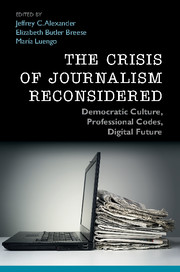Book contents
- Frontmatter
- Dedication
- Contents
- About the Contributors
- Preface
- Acknowledgments
- Introduction: Journalism, democratic culture, and creative reconstruction
- PART I THE CRISIS NARRATIVE
- PART II FEARS OF DIGITAL NEWS MEDIA: THE SYMBOLIC STRUGGLE
- PART III PROFESSIONAL JOURNALISM, CIVIL CODES, AND DIGITAL CULTURE
- 11 Journalism in American regional online news systems
- 12 Digital media and the diversification of professionalism: A US–German comparison of journalism cultures
- 13 Professional and citizen journalism: Tensions and complements
- 14 Expressions of right and wrong: The emergence of a cultural structure of journalism
- Conclusion: News innovations and enduring commitments
- Index
- References
14 - Expressions of right and wrong: The emergence of a cultural structure of journalism
from PART III - PROFESSIONAL JOURNALISM, CIVIL CODES, AND DIGITAL CULTURE
Published online by Cambridge University Press: 05 June 2016
- Frontmatter
- Dedication
- Contents
- About the Contributors
- Preface
- Acknowledgments
- Introduction: Journalism, democratic culture, and creative reconstruction
- PART I THE CRISIS NARRATIVE
- PART II FEARS OF DIGITAL NEWS MEDIA: THE SYMBOLIC STRUGGLE
- PART III PROFESSIONAL JOURNALISM, CIVIL CODES, AND DIGITAL CULTURE
- 11 Journalism in American regional online news systems
- 12 Digital media and the diversification of professionalism: A US–German comparison of journalism cultures
- 13 Professional and citizen journalism: Tensions and complements
- 14 Expressions of right and wrong: The emergence of a cultural structure of journalism
- Conclusion: News innovations and enduring commitments
- Index
- References
Summary
INTRODUCTION
A central position of this edited volume is that professional journalists and newsmakers have constructed a public understanding of contemporary journalism as being “in crisis.” Changes brought about by digital communication technologies (DCTs) and challenges to the profitability of journalism and newsmaking have fostered widespread transformations to professional journalism; threatening dominant models, practices, and industries (Ornebring 2009; Chyi, Lewis, and Zheng 2012; Ostertag and Tuchman 2012). By constructing journalism as “in crisis” professional journalists seek to protect themselves from these changes and retain control over their work. If professionalization is understood as an occupation's attempt to monopolize the right to perform certain tasks (Hughes 1963; Abbott 1988), then professional journalism is particularly vulnerable (Reich and Lahav 2001). The professional journalist specializes in general question-asking – something most people feel qualified to do (Schudson and Anderson 2009), requires little advanced education or training, and uses little of the technical language that typically serves to insulate professions from critical outsiders and lay practitioners (Schudson 1978; Lewis 2012). Yet, to what extent is journalism ever really in crisis? Do changes in technologies, economics, and/or practices necessarily result in a crisis in journalism?
Examined through the lens of cultural sociology's strong program, I argue that underlying journalism is a relatively autonomous cultural structure. Despite changes to mainstream, professional models of journalism, distribution systems and formats, the social practice of journalism will endure.
I support my argument theoretically by situating journalism in a larger social and historical context of storytelling and the moral regulation of society. I then integrate a number of complementary literatures, anthropological and historical scholarship on news (Stephens 1988; Lule 2001), cultural psychological work on morals (Haidt 2012; Graham, et al. 2013), sociological work on emotions (Jasper 2011), and cultural sociology's strong program to build a theoretical framework for a cultural sociology of journalism, and contextualize the current crisis in journalism as it is constructed.
I support my argument empirically by drawing on data collected from an ongoing project on citizen blogging-journalism in the wake of hurricane Katrina. Through interviews with bloggers and analysis of their blog posts I uncover evidence of a cultural structure of journalism and sketch out a rudimentary framework for building a broader cultural sociology of journalism.
- Type
- Chapter
- Information
- The Crisis of Journalism ReconsideredDemocratic Culture, Professional Codes, Digital Future, pp. 264 - 281Publisher: Cambridge University PressPrint publication year: 2016
References
- 3
- Cited by

